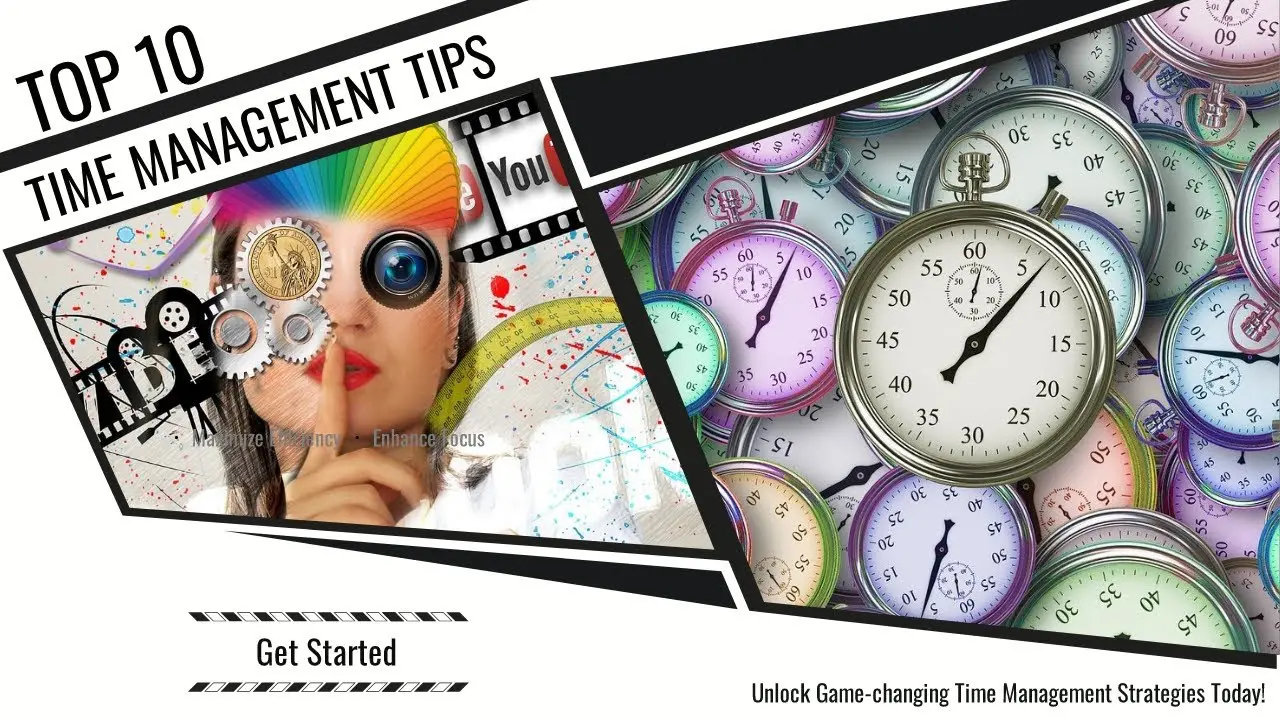As a self-employed freelancer, mastering the art of time management is more than a skill—it’s a necessity. The freedom that comes with being your own boss also carries the heavy responsibility of structuring your workday efficiently. Managing your time effectively boosts your productivity and contributes significantly to your overall well-being and job satisfaction. This guide offers the best tips and time management strategies, tailored specifically for freelancers and self-employed creatives, to help you optimize your work hours and enhance your work-life balance.
As an entrepreneur, managing time efficiently is crucial for success. In this blog post, I will share ten proven time management strategies that have significantly improved my productivity and work-life balance. These strategies are essential for any self-employed individual looking to optimize their time and achieve their goals.
1. Prioritize Tasks
When it comes to managing my time effectively as an entrepreneur, prioritizing tasks is a cornerstone of my daily routine. By tackling the most important tasks early in the day, I set myself up for success and ensure that essential work is completed promptly. This strategy not only helps me stay on track but also boosts my productivity levels significantly.
One key aspect of task prioritization is focusing on activities that truly move the needle in my business. It’s easy to get caught up in busywork that doesn’t contribute to long-term goals. By identifying high-impact tasks and giving them precedence, I make sure that my efforts are aligned with driving meaningful results.
Ensuring that essential work is completed first is non-negotiable in my time management approach. By getting crucial tasks out of the way early, I create a sense of accomplishment and momentum that propels me through the rest of the day. This proactive mindset sets the tone for a productive and successful day ahead.
2. The Power of Saying No
As an entrepreneur managing my own time, I understand the challenges of staying productive without getting overwhelmed. Prioritizing tasks is crucial in this fast-paced world. It’s all about focusing on what truly matters and saying no to opportunities that don’t align with our goals.
Being selective with opportunities is a game-changer. By carefully choosing where to invest our time and energy, we can ensure that we are working on high-impact activities that move the needle. This approach not only boosts productivity but also frees up time for essential tasks that require our full attention.
Time management is at the core of effective entrepreneurship. Time blocking allows me to dedicate specific time slots to different tasks, minimizing distractions and maximizing focus. Delegating tasks through outsourcing is another strategy I swear by. It’s about trusting others to handle certain responsibilities, giving me the mental space to focus on strategic thinking.
Technology plays a significant role in enhancing productivity. Leveraging tools and apps streamlines workflows, making tasks more manageable and efficient. Setting boundaries is equally important. Communicating clear working hours helps protect my time and maintain a healthy work-life balance.
Establishing a consistent daily routine sets the tone for a productive day. Starting with a routine that resonates with me, whether it’s a morning jog or meditation, kickstarts my day on a positive note. Regularly reviewing and adjusting plans ensures that I stay on track and adapt to changing circumstances.
Applying the 80/20 rule has been a game-changer. Identifying the most impactful tasks and focusing on them yields significant results. Finally, taking breaks and recharging is essential for sustained productivity. It’s about celebrating small victories, refining strategies, and continuously moving forward on the journey to success.
3. Time Blocking
When it comes to managing my time effectively as an entrepreneur, one of the strategies that have truly made a difference for me is time blocking. Time blocking involves dedicating specific blocks of time to similar tasks, allowing me to minimize distractions and enhance my focus. By structuring my day in this way, I can optimize my productivity by scheduling tasks efficiently.
One key aspect of time blocking is the ability to prioritize tasks effectively. By allocating focused time blocks to tasks that require similar types of attention, I can ensure that I am working on related activities in a concentrated manner. This approach helps me maintain a flow state and avoid context switching, ultimately leading to better outcomes.
Moreover, time blocking enables me to create a structured routine that aligns with my natural energy levels and peak performance times. For instance, I reserve my mornings for deep, focused work that requires my undivided attention. By setting aside specific time slots for tasks that demand intense concentration, I can make significant progress without succumbing to distractions.
Another benefit of time blocking is its impact on my overall work-life balance. By segmenting my day into designated blocks of time for work, rest, and personal activities, I can maintain a sense of boundary between my professional and personal life. This separation allows me to fully immerse myself in work during work hours and dedicate quality time to relaxation and rejuvenation outside of work commitments.
In conclusion, time blocking has been a game-changing strategy in my time management arsenal. By dedicating specific time blocks to similar tasks, minimizing distractions, and enhancing my focus, I have been able to optimize my productivity and work more efficiently. This approach not only helps me accomplish more in less time but also contributes to a healthier work-life balance, ultimately leading to greater satisfaction and success as an entrepreneur.
4. Delegating Tasks
As an entrepreneur striving for optimal time management, delegating tasks has been a game-changer in my productivity journey. Outsourcing tasks that others can handle effectively not only lightens my workload but also allows me to focus on strategic thinking and high-impact activities.
By finding reliable help for administrative tasks and social media management, I’ve freed up valuable mental space that was previously cluttered with routine responsibilities. This shift has enabled me to delve into more creative and innovative endeavors, propelling my business forward.
Efficiency strategies like delegating tasks through outsourcing are essential for maintaining a healthy work-life balance. It’s about recognizing the value of your time and energy, and entrusting certain tasks to capable individuals who can execute them proficiently.
Outsource tasks that others can handle effectively
Outsourcing tasks to specialists in their respective fields not only ensures quality results but also saves time and effort. Whether it’s graphic design, content creation, or bookkeeping, delegating these tasks allows me to focus on core business activities that require my unique expertise.
Free up mental space for strategic thinking
Delegating routine tasks not only frees up physical time but also clears mental clutter. This mental space is invaluable for brainstorming new ideas, planning long-term strategies, and envisioning the future trajectory of my business.
Find reliable help for administrative tasks and social media management
Administrative tasks and social media management are crucial but time-consuming aspects of running a business. By finding reliable help for these areas, I can ensure that essential tasks are handled efficiently, while I focus on driving growth and innovation.
5. Leveraging Technology
As an entrepreneur striving to enhance my productivity and streamline workflows, leveraging technology has been a game-changer in my daily routine. By incorporating various apps and tools into my work process, I have found innovative ways to work smarter and more efficiently.
Using Apps and Tools to Streamline Workflows
One of the key strategies I implement is utilizing apps and tools that help streamline my workflows. Whether it’s project management apps, communication tools, or file-sharing platforms, these resources have significantly improved collaboration and task organization within my team.
Enhancing Efficiency with Calendar Apps and Automation Tools
Calendar apps and automation tools play a vital role in enhancing efficiency and time management. By syncing my schedules, setting reminders, and automating repetitive tasks, I can focus on high-priority activities without getting bogged down by mundane responsibilities.
Working Smarter and More Efficiently with Technology
Technology offers endless possibilities for working smarter and more efficiently. From AI-powered solutions that analyze data to cloud-based platforms that enable remote work, embracing technological advancements has allowed me to stay ahead of the curve and adapt to the evolving demands of the business landscape.
6. Setting Boundaries
Setting boundaries is crucial for protecting our time and maintaining a healthy work-life balance. As an entrepreneur, I’ve learned the importance of communicating my working hours to my team, clients, and even family members. By establishing clear boundaries, I can optimize my productivity and ensure that my personal life doesn’t interfere with my work commitments.
One of the key aspects of setting boundaries is maintaining a healthy work-life balance. It’s essential to prioritize self-care and allocate time for relaxation and activities outside of work. By creating a separation between work and personal life, I can avoid burnout and stay motivated to perform at my best.
Consistency is key when it comes to sticking to boundaries. Whether it’s adhering to set working hours, taking regular breaks, or avoiding work-related tasks during personal time, consistency reinforces the boundaries I’ve established. This consistency not only enhances my productivity but also fosters a sense of discipline and respect for my own time.
By sticking to boundaries for optimal productivity, I can focus on high-impact tasks and avoid distractions that may derail my workflow. Prioritizing tasks based on their importance and aligning them with my working hours allows me to make the most of my time and energy. This structured approach ensures that I stay on track with my goals and maintain a healthy work-life balance.
7. Establishing a Daily Routine
As I navigate the realm of time management and productivity, establishing a daily routine has been a cornerstone of my success. Starting each day with a consistent routine sets the tone for what lies ahead. Whether it’s a brisk morning jog or a calming meditation session, these activities kickstart my day with a burst of energy and positivity.
By incorporating these rituals into my morning routine, I find myself more focused and ready to tackle the day’s challenges. The simple act of setting a positive tone early on has a ripple effect on my productivity and overall mindset.
Embracing a daily routine isn’t just about going through the motions; it’s about creating a framework that supports my goals and aspirations. It provides a sense of structure and stability in an otherwise chaotic world, allowing me to navigate my day with intention and purpose.
Through my journey as an entrepreneur, I’ve come to realize that consistency breeds success. By adhering to a daily routine that works for me, I’ve been able to cultivate habits that fuel my productivity and creativity. It’s not about rigid adherence to a schedule but rather about finding a rhythm that resonates with my unique needs and preferences.
So, as you embark on your own quest for enhanced time management and productivity, consider the power of establishing a daily routine. Whether it’s a series of morning rituals or evening reflections, find what works for you and watch as it transforms your days for the better.
8. Regular Plan Review
As an entrepreneur constantly juggling multiple tasks, reviewing and adjusting my plans regularly has been a cornerstone of my time management strategy. It’s essential to stay agile and flexible in today’s fast-paced world, where circumstances can change in an instant. By remaining adaptable and open to refining my approaches, I ensure that I operate at peak productivity and efficiency.
One of the key aspects of effective time management is the ability to recognize when a plan needs tweaking. What worked well in the past may not be as effective today, given evolving priorities and external factors. By regularly assessing my plans and being willing to make adjustments, I stay ahead of the curve and maintain a competitive edge.
Being able to stay flexible in my strategies has been instrumental in my entrepreneurial journey. It’s crucial to understand that rigidity can hinder progress, while adaptability fosters innovation and growth. By embracing change and proactively refining my approaches, I ensure that I am always optimizing my workflow and achieving optimal results.
Operating at peak productivity requires a constant commitment to honing my processes and methodologies. By consistently reviewing my plans, identifying areas for improvement, and implementing changes, I create a dynamic environment where efficiency thrives. This proactive mindset not only enhances my output but also cultivates a culture of continuous improvement within my work.
In conclusion, regular plan review is not just a task on my to-do list; it’s a mindset that drives my success as an entrepreneur. By staying flexible, adapting strategies, and refining approaches, I position myself for sustained growth and productivity. Embracing the fluidity of modern business environments, I navigate challenges with confidence and seize opportunities with agility.
9. Applying the 80/20 Rule
As an entrepreneur managing my own time, I’ve come to realize the significance of applying the 80/20 rule in boosting productivity and efficiency. This principle, also known as the Pareto Principle, emphasizes identifying high-impact tasks that yield significant results. By focusing my efforts on activities that drive outcomes and reducing time spent on less productive tasks, I’ve been able to streamline my workflow and achieve better results.
Task prioritization plays a crucial role in effective time management. By understanding that not all tasks hold equal importance, I prioritize my to-do list based on the 80/20 rule. This means that 20% of my tasks contribute to 80% of my results. By identifying these high-impact tasks, I ensure that my efforts are directed towards activities that bring the most significant returns.
Moreover, focusing my efforts on activities that drive outcomes has been a game-changer. Instead of spreading myself thin across various tasks, I concentrate on those that align with my goals and have the potential to yield substantial results. This targeted approach not only enhances my productivity but also ensures that I make progress in areas that matter the most.
Reducing time spent on less productive tasks has freed up valuable time and mental energy. By evaluating the tasks that do not contribute significantly to my goals, I have been able to delegate, automate, or eliminate them altogether. This optimization of my workflow has allowed me to dedicate more time to tasks that truly move the needle in my entrepreneurial journey.
By implementing the 80/20 rule in my daily routine, I’ve witnessed a significant improvement in my time management skills and overall productivity. This strategy has enabled me to work smarter, not harder, and achieve more with less effort. I encourage fellow entrepreneurs to embrace this principle, identify their high-impact tasks, focus on driving outcomes, and minimize time spent on less productive activities for optimal results.
10. Taking Time to Recharge
As I wrap up this blog post on effective time management strategies, I want to emphasize the importance of taking time to recharge. In the hustle and bustle of entrepreneurship, it’s easy to get caught up in the never-ending to-do list and forget to prioritize our well-being. However, I’ve learned firsthand that incorporating regular breaks into my routine has been a game-changer for my productivity and overall satisfaction with my work.
Implementing regular breaks for energy recharge is not just a luxury; it’s a necessity. By stepping away from work periodically, whether it’s for a short walk, a coffee break, or a quick meditation session, we give our minds the chance to rest and rejuvenate. These moments of respite are not time wasted but rather investments in our mental clarity and creativity.
Maintaining focus and productivity with short breaks may seem counterintuitive to some, but research shows that our brains function more effectively when we allow them brief moments of rest. Short breaks throughout the day can prevent burnout, enhance concentration, and lead to better decision-making. So, don’t underestimate the power of stepping back to move forward with renewed vigor.
Enjoying the entrepreneurial journey with adequate rest is not only about optimizing performance but also about savoring the process. Building a successful business is undoubtedly challenging, but it should also be fulfilling and rewarding. By prioritizing rest and relaxation, we can prevent burnout, foster creativity, and maintain a healthy perspective on our goals.
As I conclude this blog post, I encourage you to reflect on your own approach to time management and consider how incorporating regular breaks can benefit your productivity and well-being. Remember, success is not just about working harder but also about working smarter and taking care of yourself along the way. Here’s to finding balance, achieving your goals, and enjoying the journey as much as the destination.As an entrepreneur, time is your most valuable asset. By prioritizing tasks, leveraging technology, and setting boundaries, you can optimize your productivity and achieve your business objectives. Take the time to implement these strategies, tailor them to your style, and watch your efficiency soar. Here’s to your success in mastering time management and unlocking your full potential!
Why is time management crucial for freelancers and the self-employed?
Understanding the challenges of freelancing
For freelancers, the ability to manage your time effectively is essential. The challenges of freelancing often include unpredictable workloads, the need to juggle multiple projects for different clients, and the responsibility to track your own work time. Good time management skills enable freelancers to navigate these challenges successfully, ensuring that deadlines are met without compromising the quality of work.
Impact of good time management on productivity
Good time management directly impacts productivity. For self-employed individuals, productivity is not just about working harder but working smarter. By implementing effective time management tips and tools, freelancers can maximize their productive hours, ensuring that every minute of the workday counts. This heightened efficiency not only boosts output but also allows for valuable rest periods, preventing burnout.
The freedom and responsibility of managing your own schedule
The freedom to manage your own schedule is one of the greatest benefits of being a freelancer. However, this freedom comes with the responsibility to discipline oneself to ensure that time is utilized optimally. Effective time management for freelancers involves creating a structured workday, where specific times are allocated to focused work, client communication, and rest, enabling a well-rounded and productive workday.
How can freelancers effectively track their work hours?
The role of time management tools in tracking work hours
Time management tools are indispensable for freelancers needing to track work hours accurately. These tools not only help in logging hours spent on specific tasks but also in analyzing how your work time is distributed across various projects. This insight allows freelancers to adjust their schedules for better time efficiency.
Best practices for logging time and project management
One of the best practices for managing work as a freelancer is to maintain a detailed to-do list and a project management tool. These systems help in categorizing tasks based on priority and deadlines, ensuring that you stay on top of your workload. Regularly reviewing and updating your project lists can significantly help you manage your time more effectively.
Time tracking apps vs. traditional methods
While traditional time tracking methods like manual logging can work, time tracking apps offer a more efficient and accurate solution. These apps not only track your work hours but can also offer insights into your work patterns, helping you identify areas where you can improve your time management skills. Choosing the right app can be a game-changer in how you manage your time as a freelancer.
What are the top time management tips for maximizing productivity?
Setting clear and achievable goals
Setting clear, achievable goals is fundamental to effective time management. For freelancers, this means breaking down large projects into smaller, manageable tasks and setting specific, time-bound targets for each. This method helps create a sense of direction and purpose, keeping you focused and motivated.
Prioritizing tasks: How to better manage your time
Prioritizing tasks is crucial for managing work time efficiently. By identifying the most critical tasks and tackling them first, freelancers can ensure that their energy and focus are directed towards work that offers the most value. This strategy not only helps in meeting deadlines but also in reducing the stress of last-minute rushes.
The Pomodoro Technique: Boosting focus in 25-minute intervals
The Pomodoro Technique is a time management method that involves working for 25 minutes, followed by a short break. This technique helps freelancers maintain focus and energy over longer periods. By breaking the workday into manageable time blocks, freelancers can boost their productivity while ensuring regular rest intervals to prevent burnout.
How to select the best time management and project management tools?
Comparing popular time management and task management tools
When selecting time management and project management tools, it’s vital to compare their features, ease of use, and integration capabilities. The best tools for freelancers offer customizable options to fit your specific workflow, supporting a cohesive and efficient work process.
Integrating project management tools for cohesive workflow
Integrating your project management tools with other software you use daily can significantly enhance your workflow efficiency. Look for tools that allow integration with your email, calendar, and billing systems to streamline your work process and save time.
Customizing tools to fit your freelance lifestyle
Every freelancer has unique needs and preferences when it comes to managing their work. Customizing your project management and time tracking tools to fit your specific work style and preferences can greatly enhance your productivity and work satisfaction.
Strategies for managing distractions and staying focused
Creating a productive work environment at home
Creating a dedicated and organized work environment at home is crucial for minimizing distractions and maintaining focus. A well-structured workspace can significantly impact your productivity and help you manage your time better.
Tips for managing digital distractions
Managing digital distractions is essential for freelancers working from home. Strategies such as setting specific times to check emails and social media, using apps that limit access to distracting websites, and turning off unnecessary notifications can help maintain focus during work time.
Importance of scheduled breaks to prevent burnout
Scheduling regular breaks is vital in preventing burnout and maintaining productivity over long periods. Breaks allow freelancers to rest and recharge, ensuring that work time is more productive and focused.
Advanced time management strategies for seasoned freelancers
Delegate to elevate: Leveraging your network to manage larger projects
For seasoned freelancers, delegating tasks can be a powerful strategy to manage larger projects efficiently. Leveraging your network to delegate specific tasks allows you to focus on core aspects of your work, enhancing productivity and project quality.
Revisiting and refining your time management plan
Effective time management is not a set-it-and-forget-it endeavor. Regularly revisiting and refining your time management plan is essential to adapt to changing work demands and personal goals, ensuring continual improvement in how you manage your time as a freelancer.
Keeping up with industry trends to enhance efficiency
Staying abreast of the latest industry trends and technologies can significantly enhance your efficiency as a freelancer. Adopting new tools and strategies can streamline your workflow, helping you to stay on top of your game and manage your time more effectively.

Q: What are the best time management tips for self-employed entrepreneurs?
A: The best time management tips include tracking your time to understand exactly how much time you spend on different tasks, establishing a solid routine, prioritizing tasks, setting aside time for breaks, using technology to your advantage, saying no to non-essential tasks, and regularly reassessing your strategies to find what works best for you. Time management is one of the key elements to successful self-employment.
Q: How can I effectively track my time as a freelancer?
A: To effectively track your time as a freelancer, you can use various tools or apps designed for time tracking, which help you monitor how long you spend on each project. This practice not only helps you bill your clients accurately but also gives you insights into where your time is going, enabling you to identify areas for efficiency improvements.
Q: Why is time management for freelancers so important?
A: Time management for freelancers is crucial because, unlike traditional employment, freelancers have to manage every aspect of their work without the structure of a conventional work day. Without effective time management, it’s easy to find yourself either overworking or wasting your time, which can directly impact your income and career satisfaction.
Q: Can you give me some practical tips for freelancers to manage their day more efficiently?
A: Some practical tips for freelancers include starting your day with a clear list of tasks prioritized by importance and urgency, working in blocks of time, such as 25 minutes at a time with 5-minute breaks in between (known as the Pomodoro Technique), outsourcing tasks that are outside your expertise, and setting clear boundaries between work and personal time to avoid burnout.
Q: What tools do you recommend to help manage my time better?
A: For better time management, consider using digital tools like Trello for task organization, RescueTime for tracking how much time you spend on different websites and applications, Asana for project management, and a simple digital calendar like Google Calendar for scheduling. These tools help you keep track of your tasks and deadlines, ensuring you stay focused and efficient.
Q: How do I break the cycle of working all the time as a self-employed business owner?
A: Breaking the cycle involves setting strict work hours for yourself, learning to say no to requests that can overload your schedule, and ensuring you take regular breaks, including days off. Adequately scheduling leisure and rest times helps prevent burnout, keeping your productivity and motivation high.
Q: What is the importance of setting aside time for breaks and leisure as a freelancer?
A: Setting aside time for breaks and leisure is vital for maintaining mental health and work-life balance. Regular breaks throughout the day boost creativity and focus, preventing the diminishing returns of prolonged work periods. Leisure time helps you recharge, preventing burnout and subsequently enhancing your overall productivity.
Q: For freelancers, how does understanding ‘time is money’ influence time management practices?
A: Understanding that ‘time is money’ emphasizes the direct impact of time management on your income. For freelancers, effectively managing time means more projects can be completed within a given time frame, thus potentially leading to higher earnings. It also highlights the importance of distinguishing between high-value tasks that contribute to your income and low-value tasks that could be outsourced or minimized.





